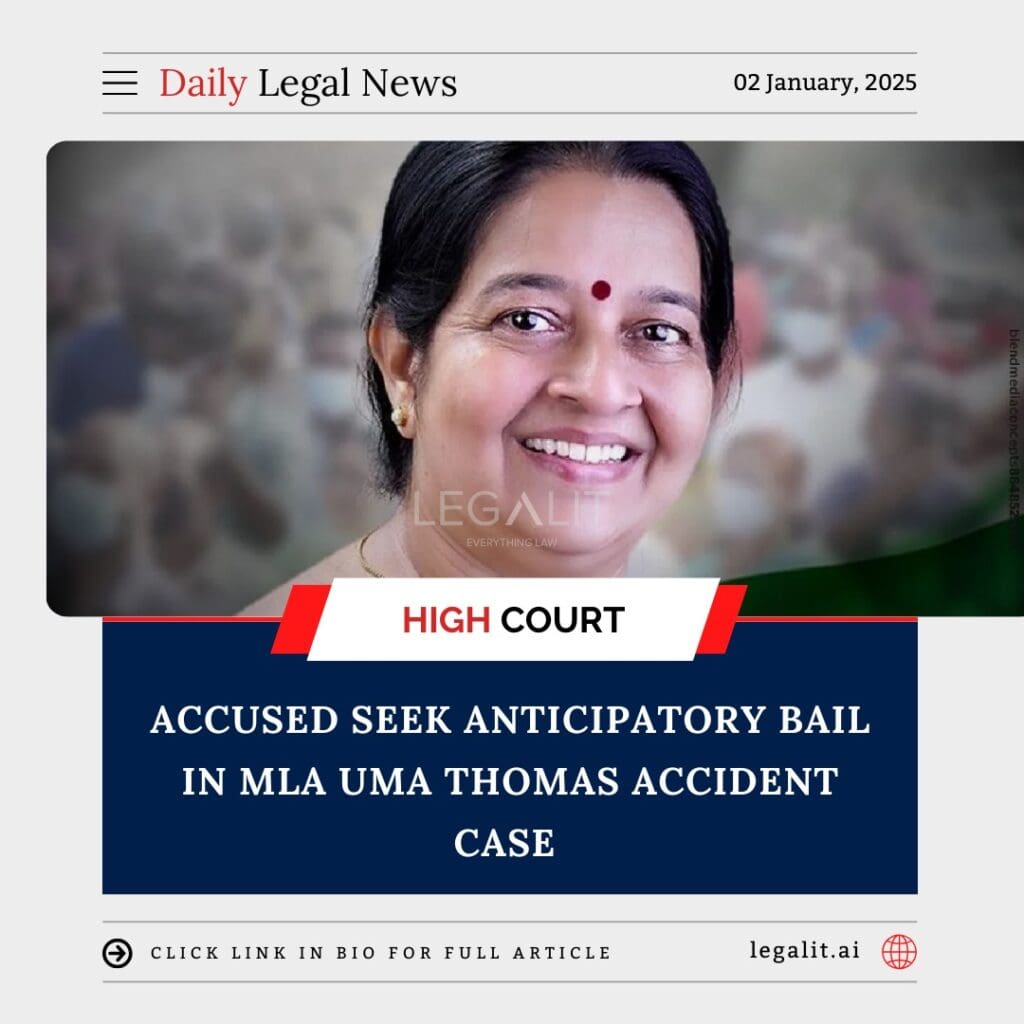
The individuals accused in the case involving the accident of Kerala MLA Uma Thomas have approached the Kerala High Court seeking anticipatory bail. The incident, which occurred recently, has drawn significant attention due to the involvement of a prominent political figure and questions surrounding the circumstances of the accident. The plea filed by the accused seeks to avoid arrest while the investigation is ongoing, citing their willingness to cooperate with the authorities.
Background
The case revolves around an accident in which MLA Uma Thomas was allegedly targeted. Reports suggest that the MLA narrowly escaped serious injury due to the incident, prompting authorities to launch an investigation. The accused individuals have been under scrutiny, with allegations of intentional harm and recklessness surfacing during the inquiry.
The accused have maintained their innocence, claiming that the incident was unintentional and devoid of any malicious intent. They argue that their immediate surrender and cooperation with the investigation demonstrate their intent to abide by the law. The anticipatory bail plea aims to protect them from potential custodial interrogation, which they believe is unnecessary given the nature of the case.
Legal Framework
Anticipatory bail, as defined under Section 438 of the Code of Criminal Procedure (CrPC), provides protection to individuals from arrest if they apprehend that criminal charges might be falsely levied against them. Courts grant such relief based on factors such as the nature of the alleged offense, evidence presented, and the applicant’s past conduct.
The Kerala High Court has a history of balancing the rights of the accused with the need for an unbiased investigation, ensuring that justice prevails while upholding individual liberties.
Arguments by the Accused
The accused have presented several key points in their anticipatory bail application:
- Lack of Intent: They argue that there was no deliberate attempt to cause harm to MLA Uma Thomas, and the incident was purely accidental.
- Willingness to Cooperate: The accused have expressed their readiness to assist the investigation in every way, thereby negating the necessity for custodial interrogation.
- Reputation at Stake: The accused have highlighted the potential damage to their reputation due to arrest, asserting that the legal process should not be punitive at the pre-trial stage.
Considerations for the Court
The Kerala High Court will weigh several factors before ruling on the anticipatory bail plea:
- Gravity of the Allegations: The court will examine whether the allegations suggest a deliberate attempt to harm the MLA or if the incident appears accidental.
- Investigation Needs: If the authorities require custodial interrogation to gather evidence or verify the sequence of events, the plea may be contested.
- Public Interest: Given the high-profile nature of the case, the court may also consider public perception and the need to ensure a fair trial.
Potential Implications
The court’s decision on the anticipatory bail plea will set a precedent for similar cases involving political figures. It may also influence public confidence in the judiciary’s ability to handle sensitive cases impartially.
If granted bail, the accused will remain free during the investigation but may face restrictions, such as reporting to the police or refraining from contacting witnesses. If denied, they risk immediate arrest, which could escalate tensions surrounding the case.
Conclusion
The Kerala High Court’s judgment on the anticipatory bail plea will be pivotal in shaping the trajectory of the investigation into the MLA Uma Thomas accident case. Balancing the rights of the accused with the need for an unbiased and thorough inquiry will be critical in ensuring justice. The decision will also reflect the judiciary’s stance on the handling of politically sensitive cases while safeguarding the principles of due process.